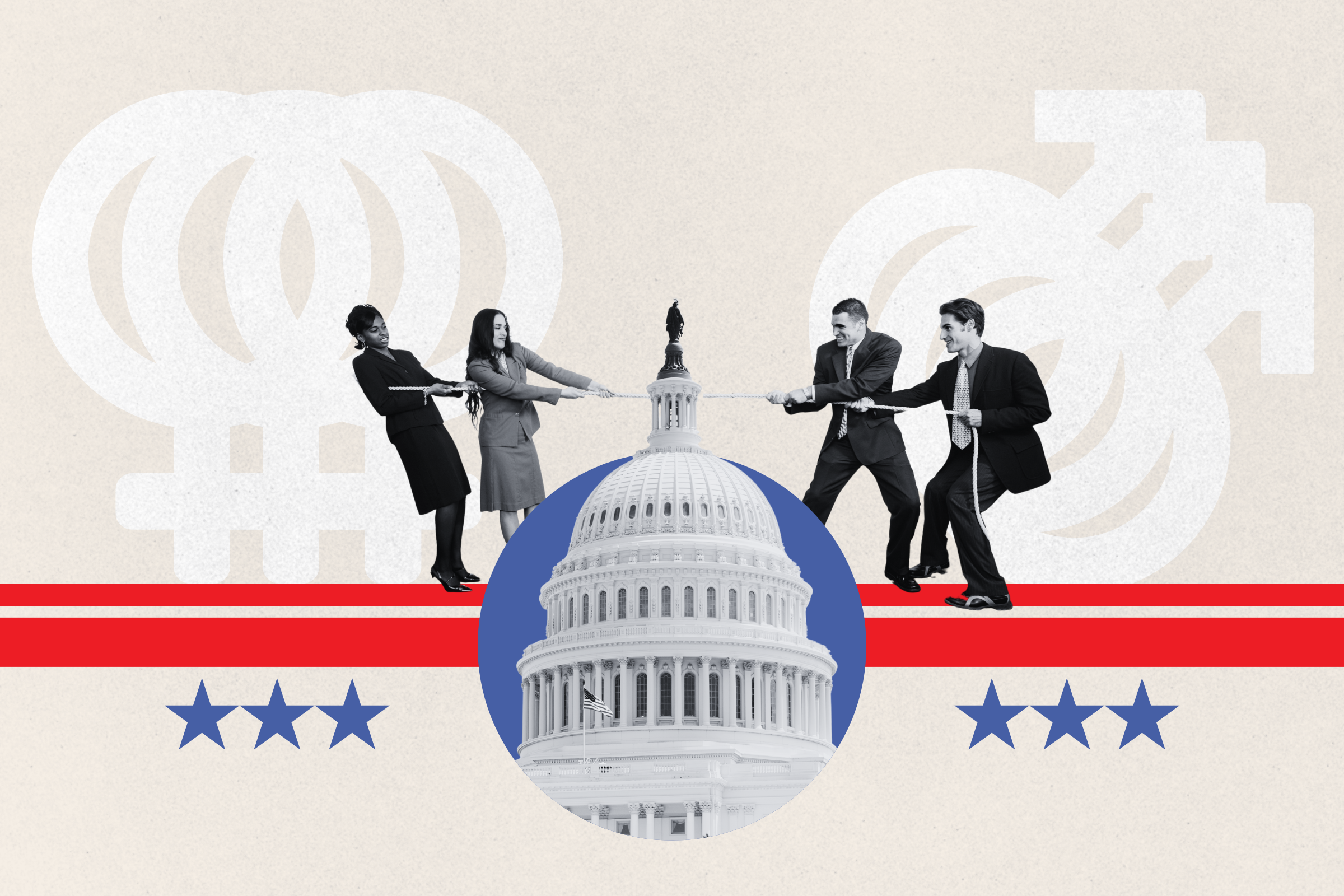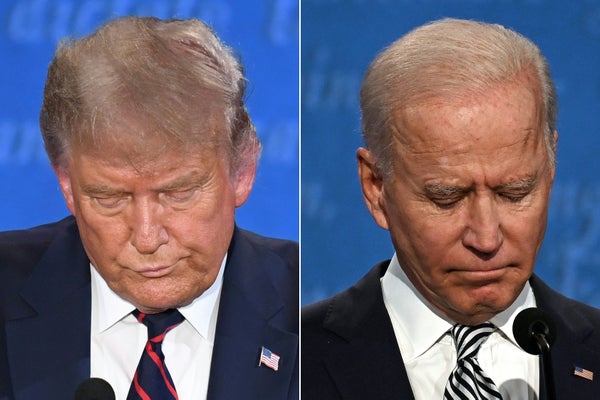The gender divide in American politics is widening, according to an exclusive poll for Newsweek that found men are increasingly embracing a more conservative ideology while women are leaning towards a liberal one.
The poll, conducted by Redfield & Wilton Strategies on behalf of Newsweek between March 23 and 24, showed that a majority of Americans—57 percent—have changed their political ideology in the past five years, with 23 percent of them becoming more conservative and 17 percent turning more liberal.
More men (26 percent) have become more conservative than women (19 percent), while slightly more women (18 percent) have become more liberal than men (17 percent). The poll is the result of interviews with 1,500 eligible voters in the country.
“It has always been the case that men, on average, vote more conservatively than women,” Elizabeth Matthew, Visiting Fellow at Independent Women’s Forum and a Young Voices contributor, told Newsweek.
“What seems to be changing is the size of the divide, and the shift toward favoring the GOP,” she continued. “In a February 2024 NBC News poll, [Joe] Biden was leading by 10 points among women while [Donald] Trump was ahead by 22 points among men. In 1988, by contrast, both women and men favored the winning candidate, Republican George H.W. Bush; women favored him by 4 points and men by 12, yielding an 8-point gender gap.”
The gender gap in U.S. politics is particularly evident in the younger generations. “Since 2018, Gen Z women have become significantly more liberal, while Gen Z men have become somewhat more conservative,” Matthew said.
According to the latest Gallup data, women aged 18 to 29 are now 15 percentage points more liberal than men their same age—40 percent of women v. 25 percent of men. Fewer men in each age group currently identify as liberal than do their female counterparts.
Newsweek‘s poll shows that 70 percent of Gen Zers changed their political ideology in the past five years, against 63 percent of millennials, 50 percent of Gen Xers and 47 percent of baby boomers and members of the Silent Generation.
“We’re seeing a shift in religiosity, with young women today being less religious than young men, and when it comes to LGBTQ+ identity, with three in 10 young women now identifying as something other than heterosexual, roughly twice the number of young men,” Dan Cox, director of the Survey Center on American Life and senior fellow in Polling and Public Opinion at the American Enterprise Institute, told Newsweek.
This shift has become more evident in the past six years. The inauguration of Donald Trump to the White House in 2017, which was immediately followed by huge protests and marches across the U.S., caused women of all ages to move further left as the #MeToo movement spread around the world.
At the same time, as traditional masculinity has been put under heightened scrutiny in recent years, “many young men feel that society no longer values them,” Matthew said, and have consequently been shifting further right in their political ideology.
“Many young men and many young women believe that they are navigating a world hostile to their gendered interests, and they differ on which party will address those interests,” she explained.
Why Men and Women Are Changing Their Politics
Among Republican voters of both genders, 37 percent have become more conservative and only 11 percent more liberal, according to our survey; among Democratic voters, only 13 percent have become more conservative while 29 percent have become more liberal.
These numbers back the idea that American politics is becoming increasingly polarized, with Republicans moving further to the right and Democrats moving further left. But what’s driving this shift—and this polarization?
Respondents to the Redfield & Wilton Strategies/Newsweek poll said that a combination of factors caused them to change their politics, including the Trump administration’s policies (31 percent), the Biden administration’s policies (24 percent), the cost of living crisis (31 percent) and the rise of inflation (31 percent) that followed the pandemic.
Some 17 percent cited Trump’s legal battles as the reason why they changed their mind on American politics, while 22 percent mentioned the events of January 6, 2021. Immigration (21 percent), crime (14 percent), “woke” culture (14 percent) and the overturning of Roe v. Wade by the U.S. Supreme Court (15 percent) were also cited.
In their responses over the causes of their political shifts, men and women gave very similar answers, though women were more affected than men by Trump’s legal battles (19 percent against 15 percent) and the cost of living crisis (34 percent against 28 percent).
More men said they were impacted by the attack on the Capitol than women (23 percent against 20 percent); the same was true for crime (15 percent against 12 percent) and immigration (22 percent against 19 percent).
Cox expects to see this gender gap show up in the 2024 presidential election.
“The midterm election in 2022 and the 2020 exit polls and voter file data revealed a pretty significant gender gap in terms of voting among young voters,” he said.
“I think it’s a double-digit gap, with young women voters supporting Democrats and President Biden in greater numbers than young men. And I would expect that to continue in 2024, though it may be more modest than in the past couple of cycles,” he added.
Can Men and Women Still Find Common Ground?
The growing gender divide in U.S. politics could have dire consequences on the way men and women interact with each other, especially as the polarization of the country’s politics causes people to embrace an “us versus them” mindset.
“Young people are not getting married or having children at anything like the rates their predecessors did at their ages,” Matthew said.
“The freefall in long -erm partnership and parenthood among 20-somethings has many causes, both cultural and economic.
“But it’s safe to say that the political polarization by gender does not help to facilitate partnerships or fertility. As political orientation becomes ever more a closely held aspect of identity, people will be ever less likely to couple up with those who do not share their political affiliation, making heterosexual family formation that much more difficult.”
In research conducted by AEI, Cox and his colleagues found that, for example, being a Trump supporter is a deal-breaker for some women, particularly for college-educated women.
“It’s notable that in the most recent Pew Research Center report the largest gender gap they noted in term of political affiliation among registered voters was among those who were single, never married,” Cox said.
“I think those gaps matter; it’s not that women would say I’d never date a Republican, but there’s a belief that your political ideology reflect your character and personal priorities,” he continued. “Women who object to dating Trump supporters told us that it’s not about a particular policy, but the concern is that if the person they’re dating admire Trump, and they admire the way he treats women, they’re not going to respect them.”
On the other hand, young men are increasingly suspicious of feminism. “Less than half of young men identified as feminist compared to more than six in 10 young women,” Cox said. “And I believe that some young men think that feminism is not simply about aspiring to gender equality and moving in that direction, but it’s about punishing men or keeping them down.
“And that is a place where I predict we might see some continuing friction between men and women.”
Uncommon Knowledge
Newsweek is committed to challenging conventional wisdom and finding connections in the search for common ground.
Newsweek is committed to challenging conventional wisdom and finding connections in the search for common ground.















